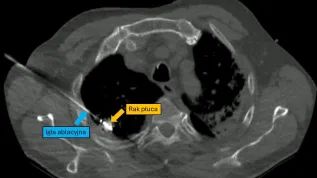
33-year-old patient who underwent face transplant at the Oncology Centre in Gliwice, has a chance for a normal life - he will be able to eat, breathe and see, although stone cutting machine almost amputated his face, assured the doctors who performed the procedure.
It was the first face transplant in Poland, and also the first so-called urgent in the world, with life-saving indications.
"We assume that the patient will eat, breathe, see. Achieving complete motor and sensory functions of the face should take 6-8 months" - said lead surgeon Prof. Adam Maciejewski at a press conference at the Oncology Centre in Gliwice.
Grzegorz, patient from Wrocław region, suffered extensive injuries on April 23 at work - a stone cutting machine amputated most of his face. Replantation attempt failed, mainly because the detached part of the face, which hung on a steel beam after the accident, was crushed, and doctors received it several hours after the accident. The surgery performed by Dr. Klaudiusz Łuczak at the University Hospital in Wrocław, however, saved the patient’s sight and the lower part of the face.
"I knew that the Cantre in Gliwice has such a great team and I contacted them. The patient was lucky to find such people. This is a challenge of galactic proportions for many centres "- said Dr. Łuczak.
The loss included not only the outer layers of the face, but also the supporting structures of the middle and lower sections of the face - jaw bone, zygomatic arches, palate. Therefore, the patient\'s life was in danger. "With such a major trauma, where structures near the base of the skull that are in contact with brain are exposed, any infection would be dangerous, not to mention the inability to function normally, breathing problems, ability to eat. It all adds up to an image that leads us in one direction" - said Prof. Maciejewski.
The search for a donor began on May 2. Doctors found a man of a similar age, who was also an organ donor for other patients. Based on the donor\'s face imprint, experts prepared a mask that replaced his tissues after collection. Prof. Maciejewski in the first words of the conference thanked his family "for great generosity, empathy, faith and courage". At the same time, with help of a psychologist the recipient prepared for surgery, which - although necessary - would significantly change his appearance. "He and his family understood the plan and the risks and dangers involved. He expressed his full agreement to this, his attitude was quite enthusiastic" - said Prof. Maciejewski.
Meticulously planned operation took nearly 27 hours, many procedures were performed at the same time. Currently, the patient is stable, in 10 days he may start to eat without help.
"He\'s on his own breath, in contact, though not communicating verbally, but nodding or gripping hands. His circulatory and respiratory systems are efficient, he cooperates in rehabilitation. His condition is serious, because the procedure was immense"- said head of Department of Anaesthesiology and Intensive Care at the Oncology Centre Dr. Krzysztof Olejnik.
The patient remains under sterile conditions, where special equipment purifies the air and where only care personnel may enters. To enable the transplant, it was necessary to induce a state of complete paralysis of the immune system, since the face, and particularly its skin, particularly strongly stimulates the immune response to reject a transplant.
"His immune cells are at this time unable to respond to any stimuli, it is a condition for a successful transplant, but this makes his vulnerable to all bacterial, viral, fungal infections. It is now a major threat. It will continue, because we cannot withdraw from this state of paralysis too quickly so as not to activate the reaction of transplant rejection. It will undoubtedly pose a threat over the next weeks, even months" - explained head of Department of Bone Marrow Transplantation and Oncohematology at the Oncology Centre in Gliwice Prof. Sebastian Giebel. He added that the rejection risk decreases every day, but the patient will have to remain on preventive medicines.
"Our goal was such that the patient can function normally, return to society as much as possible. (...) We are not miracle workers, just we simply did our job" - said Prof. Adam Maciejewski.
He admitted, however, that without previous long-term preparations such a procedure would not be possible or would fail. Building the team that carried it out took three years. "We practiced different variants of these transplants on corpses many times. It is impossible to perform such a vast, complex, three-dimensional transplantation procedure without numerous attempts. It is also a huge logistical operation. However, we met with kindness and assistance at every step" - emphasised the surgeon.
PAP - Science and Scholarship in Poland
lun/ tot/ bk/ mrt/
tr. RL
Fundacja PAP zezwala na bezpłatny przedruk artykułów z Serwisu Nauka w Polsce pod warunkiem mailowego poinformowania nas raz w miesiącu o fakcie korzystania z serwisu oraz podania źródła artykułu. W portalach i serwisach internetowych prosimy o zamieszczenie podlinkowanego adresu: Źródło: naukawpolsce.pl, a w czasopismach adnotacji: Źródło: Serwis Nauka w Polsce - naukawpolsce.pl. Powyższe zezwolenie nie dotyczy: informacji z kategorii "Świat" oraz wszelkich fotografii i materiałów wideo.













